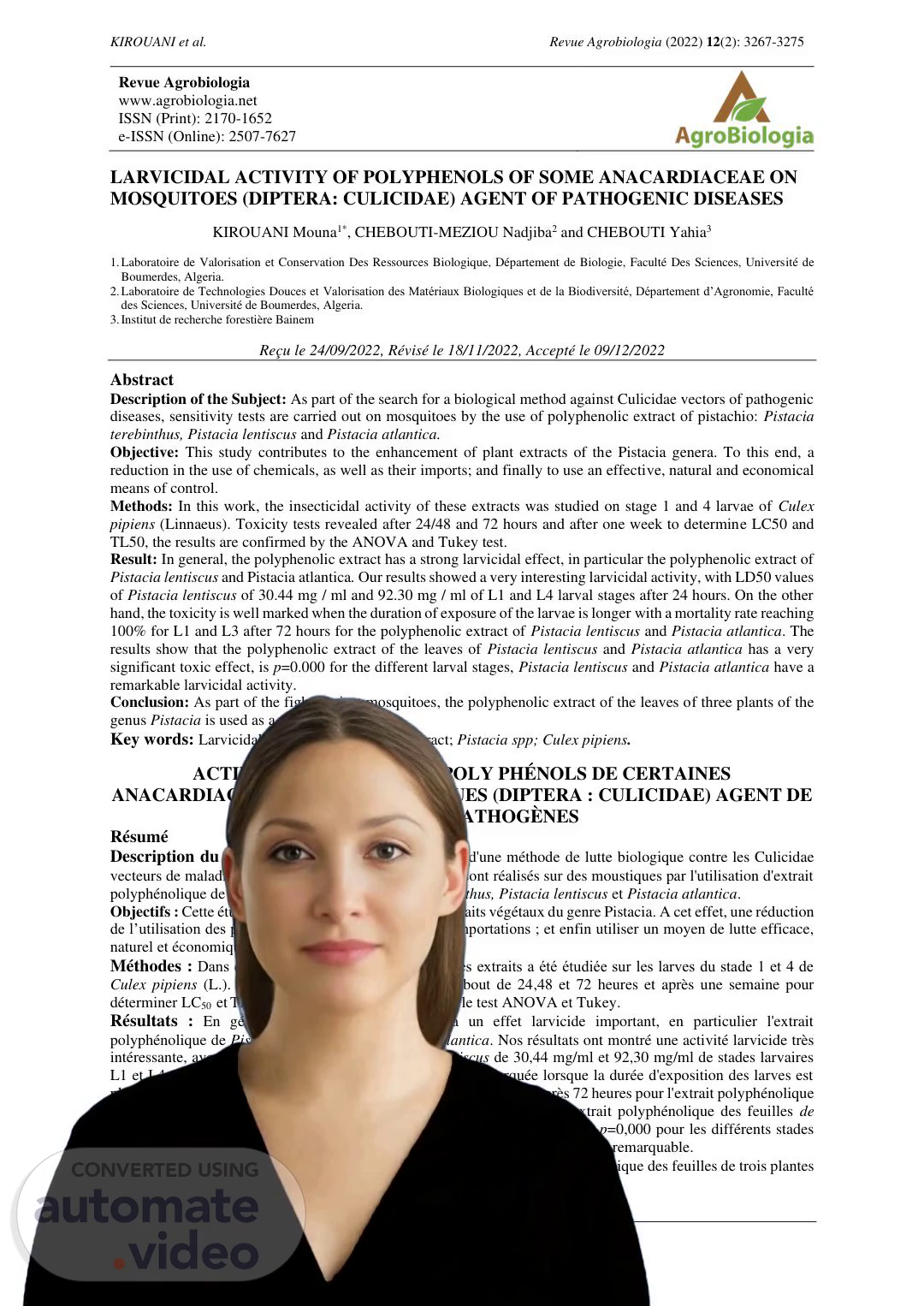
ON MOSQUITO (DIPTERA_ CULICIDAE) AGENT OF PATHOGENIC DISEASES.
Scene 1 (0s)
[Virtual Presenter] This study focused on the larvicidal activity of polyphenols from some Anacardiaceae species - Pistacia terebinthus, Pistacia lentiscus and Pistacia atlantica - on the Culex pipiens species of mosquitoes, which are vectors for a variety of diseases. The results of this study showed that polyphenolic extracts of Pistacia lentiscus and Pistacia atlantica had a strong larvicidal effect. This research has discovered a more eco-friendly and cost-effective alternative to using chemicals to control mosquito populations. Additionally, this study contributes to the enhancement of plant extracts from the Pistacia genera, with the potential of reducing the use of chemicals and their imports..
Scene 2 (49s)
[Audio] The aim of this study was to examine the effectiveness of polyphenolic compounds from three Anacardiaceae species - Pistacia terebinthus, Pistacia lentiscus and Pistacia atlantica - in controlling Culex pipiens mosquitoes. Results revealed that polyphenolic extracts from Pistacia lentiscus and Pistacia atlantica were particularly effective in killing mosquito larvae. This is a promising outcome, as Culex pipiens mosquitoes are known to be key transmitters of pathogenic diseases. As an alternative to chemical insecticides, which have a wide range of actions and can cause harm to non-target organisms and lead to environmental pollution, plant-derived compounds could constitute a more specific and eco-friendly solution..
Scene 3 (1m 38s)
[Audio] Polyphenolic extracts of Pistacia lentiscus and Pistacia atlantica were investigated for their larvicidal activity against Culex pipiens mosquito, a main vector of many diseases. Results showed both extracts possess a strong larvicidal effect. Preparation of the polyphenolic extracts included washing and reducing the leaves of the plants to powder, followed by maceration in absolute methanol for a week. The powder was then filtered, evaporated and weighed to obtain the dry residue. Yield of the extract was calculated using a specific formula, and total polyphenolic content was determined using a method..
Scene 4 (2m 22s)
[Audio] Results from this study indicate that extracts from plants in the Anacardiaceae family have a strong larvicidal activity on Culex pipiens mosquitoes. The polyphenol yields of the powder obtained from the leaves of Pistacia lentiscus, Pistacia atlantica and Pistacia vera were determined to be 34.5%, 53.1% and 68.1%, respectively. The phenolic compound content in the respective species were measured to be 0.63mg/ml for Pistacia lentiscus, 0.98mg/ml for Pistacia vera, and 0.63mg/ml for Pistacia atlantica. The LD50 and TL50 values were also determined from the Probits regression equation that was provided for the species. This study serves to provide further evidence of the potential of polyphenols from these plant species as a natural larvicide to control Culex pipiens mosquito populations..
Scene 5 (3m 28s)
[Audio] This study showed that polyphenols from Anacardiaceae species Pistacia terebinthus, Pistacia lentiscus and Pistacia atlantica have strong larvicidal activity against Culex pipiens mosquitoes, which are vectors of pathogenic diseases. The corrected mortality rates for the different larval stages of Culex pipiens in response to the dose of polyphenol extract showed a potent effect from Pistacia lentiscus and Pistacia atlantica. The toxicity of the extracts was also supported by the LC50 values. The TL50 for the polyphenol extract of each species was also found to be significant. These results indicate the potential of polyphenolic extracts from Anacardiaceae species as effective larvicidal agents..
Scene 6 (4m 19s)
[Audio] A study was carried out which found that polyphenolic extracts of Pistacia lentiscus and Pistacia atlantica had a strong larvicidal effect on Culex pipiens mosquitoes. Variance analysis of the different polyphenol doses of Pistacia lentiscus, Pistacia atlantica, and Pistacia vera on the four larval stages was conducted using the Tukey test. This test showed the efficacy of the polyphenol extract doses of the leaves of these plants on the Culex pipiens larvae, as outlined in Tables 11, 12, and 13. The results demonstrate a clear larvicidal effect of the two Anacardiaceae species on Culex pipiens mosquitoes..
Scene 7 (5m 4s)
[Audio] This study investigated the larvicidal activity of polyphenols from Pistacia terebinthus, Pistacia lentiscus and Pistacia atlanica on Culex pipiens mosquitoes, vectors of pathogenic diseases. It was found that polyphenolic extracts from Pistacia lenticus and atlantica were effective larvicidal agents. Methanol showed no insecticidal effect and the life cycle of the tested mosquitos progressed normally. Variation in the amount of polyphenolic compounds varied according to plant species, geographical zone, growth stage, harvest period and the solvent used for extraction. These results suggest that polyphenols from Anacardiaceae species could be potentially used as safe and effective larvicidal agents..
Scene 8 (5m 56s)
[Audio] Examining the larvicidal activity of polyphenols present in certain Anacardiaceae species like Pistacia terebinthus, Pistacia lentiscus, and Pistacia atlantica on Culex pipiens mosquitoes, vectors of infectious diseases, data analysis found that polyphenolic extracts from Pistacia lentiscus and Pistacia atlantica both had a strong larvicidal effect. This research thus strongly suggests the use of these polyphenols as a natural bio-insecticide, representing an effective way to reduce vector transmission of illnesses such as malaria..
Scene 9 (6m 33s)
[Audio] Research was conducted to assess the larvicidal activity of polyphenols from three Anacardiaceae species: Pistacia terebinthus, Pistacia lentiscus and Pistacia atlantica on Culex pipiens mosquitoes. Results showed a strong larvicidal effect of polyphenolic extracts from Pistacia lentiscus and Pistacia atlantica. Experiments were conducted to investigate factors such as phenolic composition, biological activities, and insecticide effectiveness. Statistical analysis of the data was also performed, using methods such as the Trimmed Spearman-Kaber method and Probit Analysis. The results suggest that polyphenolic extracts from Pistacia lentiscus and Pistacia atlantica could be an effective tool in controlling the spread of mosquito-borne diseases..